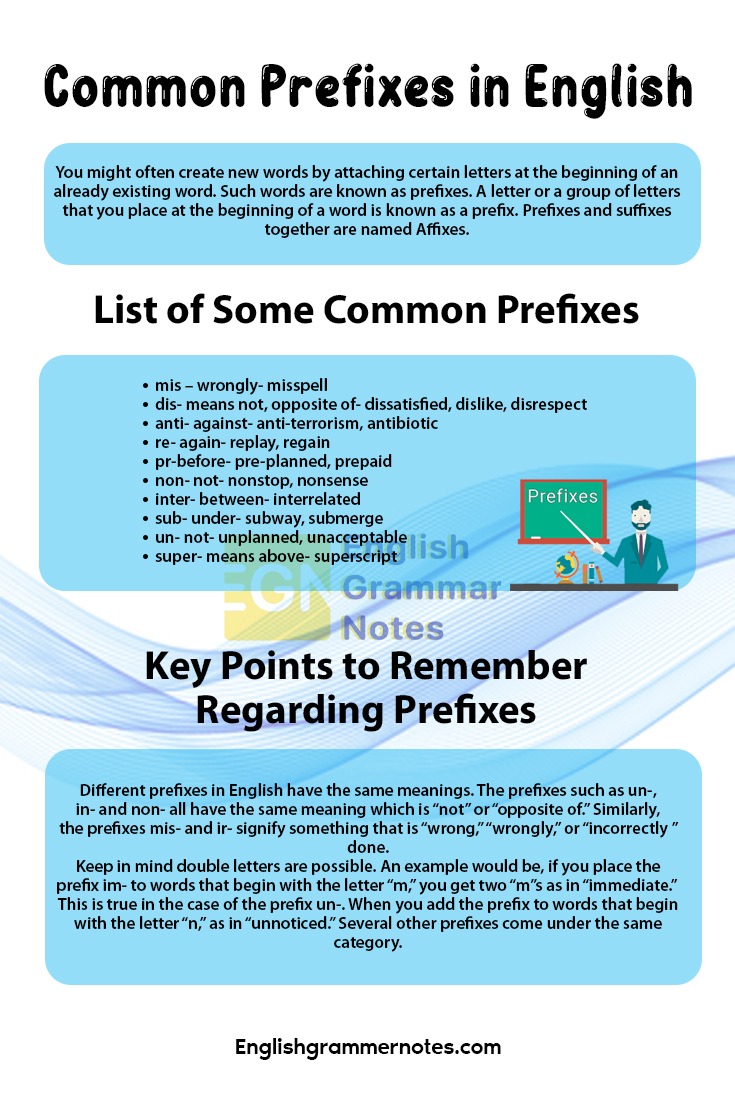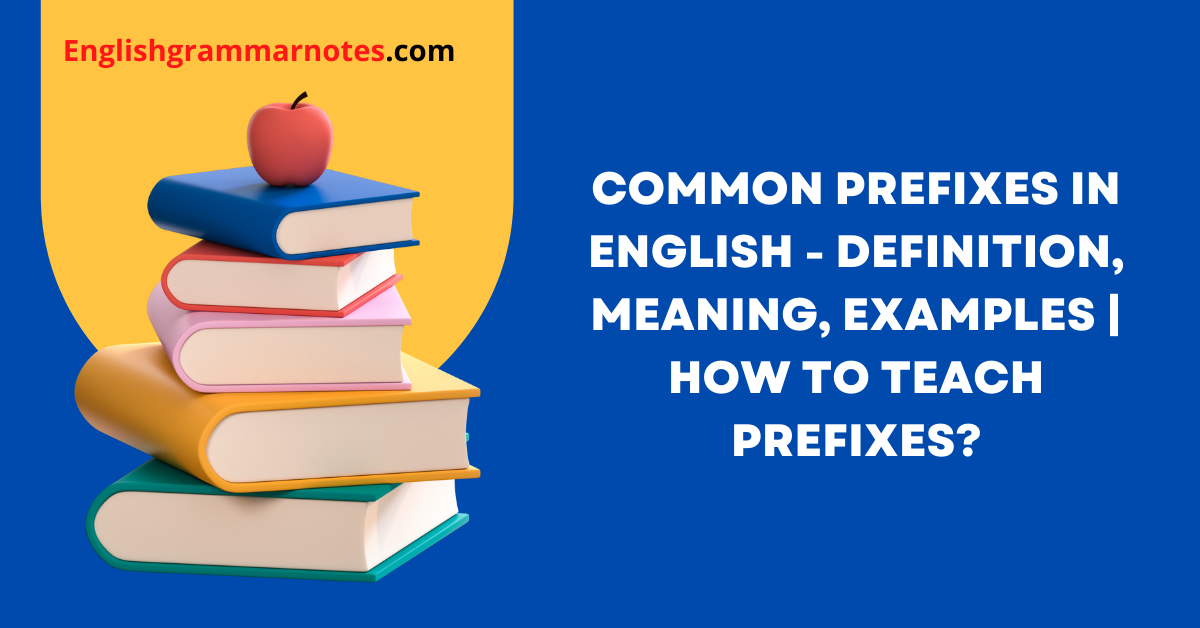You might often create new words by attaching certain letters at the beginning of an already existing word. Such words are known as prefixes. A letter or a group of letters that you place at the beginning of a word is known as a prefix. Prefixes and suffixes together are named Affixes.
The addition of prefixes changes the meanings of words. For instance, the prefix un- means “not,” “remove,” or “opposite.” The addition of the prefix un-to the word “educated” gives the word “uneducated,” which refers to someone who is not educated.
Prefixes cannot be considered words in their own right and therefore they cannot stand on their own. If they exist as independent words they will surely be separated from the root word by a hyphen. The two most common prefixes in the English language are un- and re-. The prefix “re-” signifies “again” or “back,” as in the given words redo, rethink, reply, repack, etc.
- List of Some Common Prefixes | Essential Common Prefixes in English
- Key Points to Remember Regarding Prefixes
- Types of Prefixes
- Tips for Adding Prefixes
- Can prefix reduce word count?
- What are some of the common prefixes used in English?
- Distinguish between a prefix and a suffix?
- Give any 5 examples of prefixes?
List of Some Common Prefixes | Essential Common Prefixes in English
Have a look at some of the most used prefixes in English:
- mis – wrongly- misspell
- dis- means not, opposite of- dissatisfied, dislike, disrespect
- anti- against- anti-terrorism, antibiotic
- re- again- replay, regain
- pr-before- pre-planned, prepaid
- non- not- nonstop, nonsense
- inter- between- interrelated
- sub- under- subway, submerge
- un- not- unplanned, unacceptable
- super- means above- superscript
Key Points to Remember Regarding Prefixes
- Different prefixes in English have the same meanings. The prefixes such as un-, in- and non- all have the same meaning which is “not” or “opposite of.” Similarly, the prefixes mis- and ir- signify something that is “wrong,” “wrongly,” or “incorrectly ” done.
- Keep in mind double letters are possible. An example would be, if you place the prefix im- to words that begin with the letter “m,” you get two “m”s as in “immediate.” This is true in the case of the prefix un-. When you add the prefix to words that begin with the letter “n,” as in “unnoticed.” Several other prefixes come under the same category.
- When you add a prefix to a word, the spelling of the base word never alters. For example, the prefix un- brought about no change in the spelling of the word “happy.” And, the prefix re- similarly does not alter the spelling of the word “live” in “relive.”
- Beware of “lookalikes”. They are words that look like they have prefixes but do not. For instance, take the word “uncle” un- in the word is not a prefix. Similarly, the re- in the words “reach” or “real” cannot be considered as prefixes.
- There are prefixes with the same meaning with only slightly different spelling variations, as in the following words: imperfect, insensitive, illiterate, etc. The reason for similar spelling is the rules of pronunciation.
Types of Prefixes
Now that you are familiar with what prefixes are and the most common prefixes, let’s have a look at the different types of prefixes.
Prefixes of Negation
These prefixes, when added to a word, negate the meanings of such words. Examples of such prefixes include:
- Mis: Examples include: misunderstand, misspelled, misuse, misdirect, misguided, etc.
- Non: Examples: non-academic, nonreactive, non-teaching, nonentity, nonsense,etc.
- Un: Examples include: unreasonable, unconscious, unrepentant
unhappy, untie, etc - Mal: Examples: malfunction, maltreat,maladjustment, malnutrition,etc.
Prefixes of Manner
- Mid: Examples include midway, midair, mid age, mid-afternoon, etc.
- Over: Examples include: overcooked, overlooked, overseas, overview, overall.
- Under: Examples include: undercooked, undercurrent, etc
Prefixes of Number
- Uni: Examples include:, unicellular, unicameral, unidirectional, unilateral, unisexual, etc.
- Di/Bi: Examples include: bilateral, bicameral, dicotyledon, bi-annual, bi-weekly, etc.
- Tri: Examples include: trisect, trimonthly, tricycle, triangle, triaxial, trigon, etc.
- Quad: Examples include: quadrilateral, quadragenarian, quadruplet, quadrangle, etc.
- Multi: Examples include: multilateral, multi-directional, multiverse, and multilingual.
Prefixes Emphasizing Degree
- Hyper: Examples include: hyperactive, hyperventilate, hypersensitive, hyperinflation, and hypermarket. etc.
- Over: Examples include: overgeneralizing, overcharge, overdue, overloaded, oversize, etc.
- Super: Examples include: superstar, supersonic, superscript, supermarket, superman, supernatural, supernormal, etc.
- Mini: Examples include: mini-mart, minivan, mini stadium, miniskirt, minibus, etc.
Prefixes of Location or Direction
- Pre (Meaning: before in time, rank, order, position): Examples include: predate, preeminent, premeditation, prefrontal, prepaid, preschool, prefix, etc.
- Post ( Meaning: After in time or sequence; Following; Subsequent): Examples include: postmortem, postdate, posthumous, postnatal, postfix, post-paid, and post-primary.
Hyphenated Prefixes
Are those which come with a hyphen. That is, a hyphen is placed between the prefix and the root word. Examples include self-absorbed, self-obsessed, ex-communicate, etc.
Do Read:
Tips for Adding Prefixes
- Whenever you add a prefix, the spelling of the base word remains the same. Example: did+ interested= disinterested
- As mentioned earlier, be cautious when double letters can occur. In such cases, both prefix and root word attain their original spelling.
- Watch out for prefix look-alikes. Some words appear to carry a prefix, but on close examination, it becomes clear that they are not prefixes. Example: real, uncle, etc.
- Make use of hyphens only when needed.

FAQs on Prefixes
1. Can prefix reduce word count?
Yes. A letter or a group of letters that you place at the beginning of a word is known as a prefix. Prefixes help in reducing word count. Examples include: Not wanted – unwanted
Not interested- disinterested
2. What are some of the common prefixes used in English?
A letter or a group of letters that you place at the beginning of a word is known as a prefix. Some of the common prefixes used in English include: ‘un’, ‘re’, ‘dis’, ‘mis’ etc.
3. Distinguish between a prefix and a suffix?
A letter or series of letters added at the beginning of a root word is known as a prefix. Example: Take the word interest. By adding the prefix ‘dis’ a new word ‘disinterest’ is formed. On the other hand, a suffix is added at the end of the root word.
4. Give any 5 examples of prefixes?
- un- unlucky, unsatisfied, etc.
- dis- dislike, disloyal
- re- reload, reply
- mal- malnutrition, malware
- post- postpone, postpaid.
Conclusion
Understanding what prefixes are will help you to quickly and effectively build your vocabulary. If you’re able to comprehend the various types of prefixes and their applications you’ll surely be able to expand your vocabulary accurately and efficiently. This will also equip you to deal with any unknown words you may encounter. So make sure you give your best when it comes to understanding prefixes. Check out the article on Transition Words for Essays as well to become familiar with various words.
